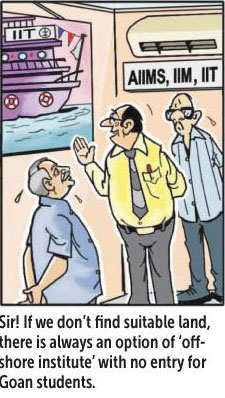
Annalie Rodrigues
Goa, a state that usually thrives on its ‘Xit, Kodi, Nuste’, faces the annual 61-day fishing ban from June 1 to July 31 in an attempt to safeguard its marine resources and ensure sustainable fishing practices. Annually, the ban is enforced to facilitate fish reproduction to replenish the waters. The ban includes a range of fishing techniques, such as trawl nets, purse seine nets, and other fishing methods that depend on mechanical propulsion.
The Goa Marine Fishing Regulation Act of 1980 prohibits fishing vessels with mechanical propulsion from operating during this time. Yet there are some exceptions; as long as they use gill nets alone, registered motorised canoes with outboard or inboard motors up to 10 HP are permitted to continue fishing. Officers are monitoring right from Pernem to Canacona to ensure the enforcement of the ban and action will be taken if any illegal fishing activity takes place. This ban, which applies to the whole of Goa's territorial waters and seacoast, demonstrates the government's dedication to protecting marine species. This proves the commitment of the state to promote sustainable fishing practices in order to maintain the long-term welfare of Goa's marine ecosystem.
While the ban proves to be beneficial for the well-being of the marine ecology in Goa, it also leaves the fishermen without a job for these two months. All those involved in this sector suffer losses and need to look for alternate sources of income, use up their savings, or borrow from traders and banks to sustain their livelihood.
They can explore alternative seasonal jobs in agriculture, tourism, or other sectors to supplement income during the fishing hiatus. This downtime can also be used by them to repair old fishing nets, paint and refurbish their boats to increase their lifespan, plug any possible leaks in the boats, check all the fishing gear and buy whatever new equipment is required. They can also invest this time in training and skill-development activities related to fishing or other interests. This could include attending workshops on sustainable fishing practices and learning new fishing techniques. These two months also present them with the opportunity to spend quality time with their families, engage in recreational activities, and focus on their personal well-being.
One of the major issues being faced by traditional fishermen is the illegal fishing by trawlers from outside Goa, particularly from Karnataka and Maharashtra, which poses a serious threat to their livelihoods. Bull trawling is the primary method of fishing used, in which two boats pull nets to capture a large number of fish. These boats swarm the waterways around Goa to secure a major catch. Although the Goan fishermen have brought up this issue on multiple occasions, their concerns have been ignored. By using bull trawling and speed fishing boats to fish so close to the Goa coast, these nearby fishermen are depleting the marine resources. The small-scale, traditional fishermen struggle to catch a good enough number of fish because of outside fishing boats that use LED lights to attract more fish and bull trawling, which depletes marine resources.
Mayur Khandeparker, from Margao, who handles wholesale selling of fish, says, “Since this is an annual ban, we plan in advance for it so that we are not financially affected much. During the Purumentachem Fest in Margao, we sell all our stocked-up fish and make a good profit that can be used in these two months. In this off-season, we also focus on selling fish coming from neighbouring states like Kerala as a small source of income. This period is used to maintain and repair the equipment and serves as an enjoyable break from fishing as well. A major problem that we face is bull trawling and usage of LED lights by neighbouring state’s fishermen which serve as a menace to us during this ban as they deplete the marine resources and compromise on their breeding period. This happens because there isn’t sufficient surveillance to stop them from entering and fishing in our seas.”
A fisherman from Fatorda, says, “For these two months, I have taken up a temporary job as a delivery agent to manage my finances and support my family. I usually prefer to take up an alternate job during these two months to avoid using up my savings as I wish to use that money for my child’s further education. I am also using this time to repair my fishing net and paint the hulls of my boat in preparation for when the ban is lifted. Currently we have not been able to start this process yet due to the heavy rains.”
A fisherman from Colva who owns and handles trawlers, says, “During these two months, we use the savings of the months that we are allowed to go fishing so I do not need to look for an alternate job. Although we want to use these months for engine checks and painting work, this is sometimes kept pending due to the heavy rains. When the ban is going to be lifted we also begin looking for labourers but since most of them are migrant labourers they usually move to other places or into other occupations thus making it difficult for us to get labourers for a fair wage.”
It is therefore seen that the fishermen of Goa are casting nets of resilience and manoeuvring their way through these trying months as they wisely utilise this time to maintain and improve their equipment while also exploring alternative sources of income. Despite facing threats from external competition and illegal fishing practices, the fishermen of Goa demonstrate their unwavering commitment to preserving their way of life and the marine ecosystem upon which it depends.
